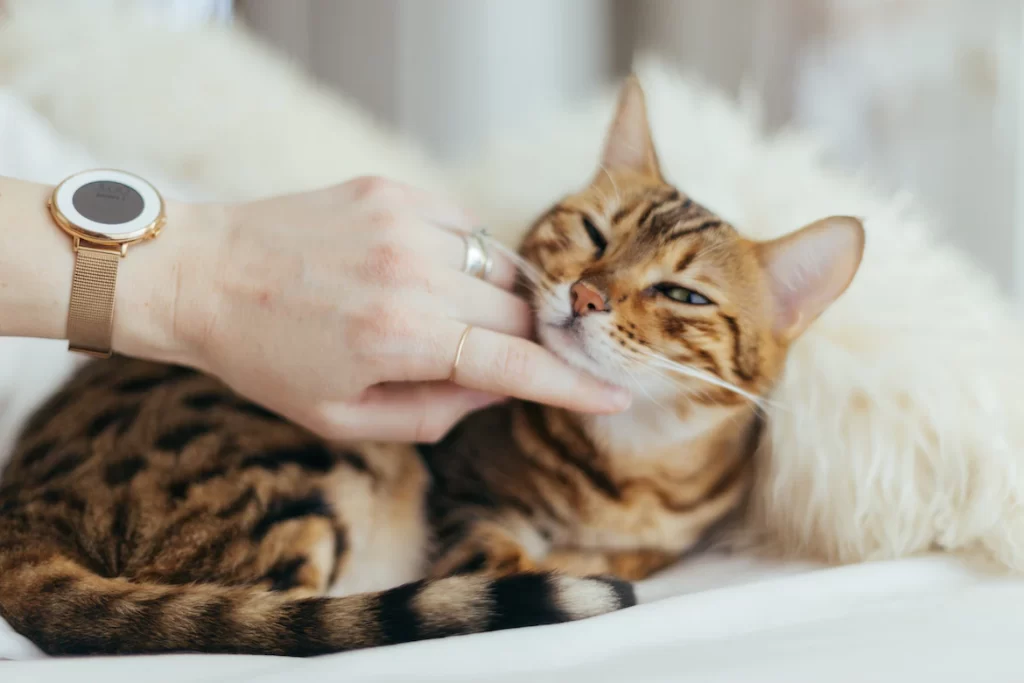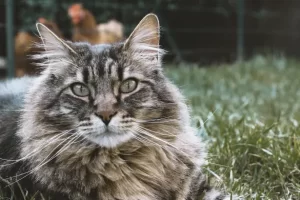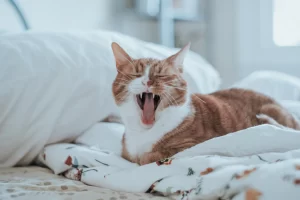Last updated on February 22nd, 2023 at 06:59 am

Like humans, cats can get upset stomachs and have diarrhea, but seeing watery excrement within or outside the litter box can be rather concerning to pet owners. Diarrhea is mainly considered as the frequent passage of stools that is mucus-filled or watery. There are numerous underlying reasons for diarrhea, ranging in severity from moderate to extreme, and they may be symptoms that something is not quite right. We will discuss some causes of diarrhea in your cat or kitten, home treatment for cat with diarrhea, and ways to clean a cat’s diarrhea.
Reasons cat and kitten may suffer from diarrhea
#1. Food allergies or intolerance
Any unfavorable reaction to food is referred to as food intolerance, which can be brought on by sensitivity to a specific ingredient, a shortage of the digestive enzymes required for particular foods, stress, or food poisoning. Intolerant reactions to any diet component can result in most food allergies like sources of carbohydrates or protein. Food allergy refers to an unusual immune reactivity to ingredients generally considered safe. Skin and digestive systems are both affected by food allergies. Cats’/kitten’s most common food allergies include beef, chicken, eggs, fish, and chicken. Certain pet meals can have irregular production techniques and contain many preservatives, flavors, and additives. These increase the possibility that particular foods will lead to reactions. You should consult your veterinarian regarding the best cat food choices.
#2. They may have infections
Bacterial infections, such as salmonella or E. coli, can cause diarrhea in cats and kittens. These infections can be passed on through contact with contaminated food or water. A few of these illnesses, like feline parvovirus, can be prevented through vaccination, but others, like salmonella, cannot. Set up an appointment with your vet if your pet is sick. And you can also use the home treatment for cat with diarrhea that we will discuss in the sections coming below.
#3. They may have pancreatitis
The pancreas is crucial to how our bodies work. It has endocrine glands that produce glucagon and insulin, which regulate blood sugar, and exocrine glands aiding digestion. When the pancreas is inflamed, it leads to pancreatitis; while it can happen in people with diabetes or inflammatory bowel disease, pancreatitis in cats appears to happen randomly and without apparent cause. The severity of pancreatitis can range from moderate to severe, and it can even be fatal. Getting an accurate diagnosis and prompt treatment from a vet is crucial because many of the signs of pancreatitis are also indications of other illnesses.
#4. Adverse Reactions to antibiotics or other medicines
Antibiotics and other medicines are required to treat different illnesses, but they also have side effects. Diarrhea is a common side effect of antibiotics due to the disruption of the normal balance of bacteria in the gut. Antibiotics are designed to target and kill harmful bacteria, but they can also kill beneficial bacteria in the gut. This can lead to an overgrowth of pathogenic bacteria, which can cause diarrhea in cats. It is important to contact your veterinarian if your cat is experiencing diarrhea, as the underlying cause may need to be determined and appropriate.
#5. They have hairballs
Cats frequently have hairballs. Constipation is their usual side effect, but because they are straining to empty tiny volumes of liquid, this might occasionally appear to be diarrhea. Long-haired cats are frequently but not always prone to hairballs. For cats with hairballs, there are specialized supplements or diets, and the home treatment for cat with diarrhea that we will discuss in this article later.
#6. May have gastrointestinal parasites
Cats are susceptible to parasite infestation. Once gastrointestinal parasites have affected the digestive tract, diarrhea is frequently the consequence. The most frequent parasites that affect the digestive tract are hookworms, roundworms, giardia, and tapeworms; however, many other species can also affect them. Parasites can lead to disastrous repercussions, particularly to tiny kittens growing if they are left untreated. Contact your veterinarian right away for the right care if your cat exhibits any indications of a parasite illness.
#7. Due to dietary imprudence
Dietary indiscretion is when your cat consumes inappropriate foods. Some cats might dig through the rubbish or find an intriguing dead carcass. Sadly, not all cats will be intelligent enough to leave them alone. The waste your cat or kitten has consumed may result in diarrhea. For instance, taking moderate or extreme toxins can lead to watery stool, which in some cases may require surgery to remove. Sometimes, when your furry friend takes in bacteria that can cause harm like salmonella may lead to food poisoning; the cat can easily transfer bacteria to you. If you need to clean up your pet’s diarrhea, it’s best to use good hygiene practices, such as gloves and washing your hands thoroughly.
#8. They may have liver disease
Aside from filtering blood, the liver also produces albumin and bile, regulates amino acids, breaks down glucose, stores minerals and vitamins, controls blood clotting, and fights off infections. Any condition that compromises the liver’s health and function is called liver disease. Liver illness has a wide range of potential causes, and the appropriate course of action depends on the precise diagnosis. Cats with liver disease frequently experience diarrhea, but numerous other common conditions can also result in watery stools.
#9. They are stressed
Stress is one of the most common reasons cats and kittens suffer from diarrhea. Stress can be caused by a variety of factors such as a change in routine, a new pet in the house, a move to a new home, or a medical condition. It’s a good idea to consider strategies to assist your cat in adjusting to anticipated circumstances because various scenarios and underlying issues can cause stress. It’s crucial to get them examined by a veterinarian to exclude any health-related problems because stress can also indicate underlying medical issues.
#10. Cancer
Cats can get various cancers, one of the main reasons older cats pass away. When a cat has cancer, the cancerous cells can cause inflammation in the intestines, resulting in diarrhea. The destruction of the intestinal lining can also interfere with the absorption of nutrients, leading to malabsorption, which can also cause diarrhea.
#11. They have hyperthyroidism
Hyperthyroidism is a condition that affects a cat’s endocrine system. The condition steadily worsens over time and is more prevalent in middle-aged to older cats. Excessive thyroid hormone generation from the thyroid gland is the underlying cause of the illness. Depending on the problem’s severity, many treatments are available for hyperthyroidism. It includes anything from dietary adjustments to medicine and, in more extreme circumstances, radioactive iodine therapy & surgery. With early detection and appropriate treatment, the prognosis may be favorable.
#12. Drastic diet change
Dietary changes in diet may also cause diarrhea, and with home treatment for cat with diarrhea, this problem can be sorted out. There are various reasons you could decide to change the food your cats take; however, this may have unexpected consequences. A smooth transition is strongly advised when switching cat meals to help prevent any digestive distress, though a slow transition may not eliminate negative effects. Before implementing any modifications, it is always advisable to consult your vet and get advice. Once the course of treatment is effectively completed, they will advise you on a preventative care strategy.
#13. They have IBD (inflammatory bowel disease)
Inflammatory bowel disease is a disorder where the digestive tract is constantly irritated and inflamed. Although any region of the gastrointestinal tract can be impacted by inflammatory bowel disease, the small intestines and the stomach are the most commonly affected organs. Diagnostic procedures may include a range of laboratory testing and imaging because the symptoms of inflammatory bowel disease can also be seen in several other illnesses. Although signs might come and go with this illness, treatment options include dietary changes and a range of drugs.
Home Treatment For Cat With Diarrhea
#1. Use probiotics
Normal digestion in cats depends on healthy bacteria populations in their intestines. A cat’s diarrhea may occasionally persist if their regular bowel movements are disturbed long after the primary causes like stress, illness, or antibiotic treatment have subsided. A cat’s gut bacterial population can be helped to return to normal by using probiotic supplements. Select a probiotic that is created by a trustworthy firm that is marketed for use in cats.
#2. Increase their water and electrolytes intake
This home treatment for cat with diarrhea with help them avoid dehydration. Maintain clean, fresh water in your cat’s bowls, and consider including an additional bowl with diluted beef or chicken broth. Transitioning from kibble to canned food for your cat is another simple approach to enhancing his water consumption. You can temporarily add a tablespoon or two of lukewarm water to the feline’s canned food.
#3. Get anti-diarrheal drugs
Many anti-diarrheal drugs shouldn’t be administered to cats without a vet’s approval. Some are outright harmful, but cats can safely take kaolin-pectin treatments. The usual dosage recommendation is a single teaspoon for five pounds (body weight) administered after 4 to 6 hours. Note that several products that once contained kaolin-pectin in the US, such as Kaopectate, are now produced with different components.
#4. Give them fiber
A low-fiber diet that is highly digestible can help some types of feline diarrhea recover. The best type of fiber to give a cat with diarrhea is soluble fiber. Soluble fiber dissolves in water, forming a gel-like substance that adds bulk and absorbs excess water in the intestines, helping to firm up stools. Good sources of soluble fiber include pumpkin, sweet potatoes, parsnips, oat bran, and psyllium husk. These can be mixed with a small amount of water and added to the cat’s food. Introducing fiber gradually is important to avoid further digestive upset. It is important to consult a veterinarian for any major health issues and to ensure that the diarrhea is not caused by a more serious health condition.
#5. Adjust the cat’s diet
It is unnecessary to stop feeding cats who are diarrheic. Doing so can impede the digestive tract’s capacity to heal itself and expose cats to the risk of hepatic lipidosis, a potentially fatal form of liver illness.
The first step in adjusting the cat’s diet is to offer a bland diet that is low in fat and high in easily digestible proteins. Boiled chicken or turkey with the skin removed is a good choice for a bland diet. The cat should be fed several small meals throughout the day in order to help prevent any further digestive issues. Additionally, it is important to avoid any treats or table scraps, as these can be difficult for cats to digest and can cause further digestive issues. If the cat’s diarrhea is caused by food allergies or sensitivities, it is important to identify the specific allergen and eliminate it from their diet. It may also be necessary to transition to a more hypoallergenic diet, such as a grain-free or single-protein diet. This home treatment for cat with diarrhea will go a long way in improving the overall health of your cat.
When Should You Take The Cat And Kitten To See A Vet?
When determining if your cat needs to visit a veterinarian, consider the severity of his diarrhea and general health. It makes sense to attempt some at-home remedies, however, contact your veterinarian right away if the following happens:
- You know that your cat swallowed an object that could potentially obstruct the intestines or stomach.
- The stools are bloody or extremely dark or black.
- Your cat does not respond to home remedies for tiny kittens after three days or a day.
- It takes your cat more than twenty-four hours to finish its food, or your kitten skips over one meal.
- Your cat becomes sluggish or weak.
- When the diarrhea is severe, watery, violent, or occurs often.
- If in a short time, your cat has experienced many episodes of diarrhea or vomit
- The cats/kitten’s abdomen is painful or swollen.
- Check for skin tent time /dry sticky gums if your feline is dehydrated.
How To Clean Up A Cat’s Diarrhea
After knowing all the above home treatment for cat with diarrhea, it is now time to clean the mess. Pick up the debris with a paper towel, and then clean the area with a solution of mild detergent and water while scrubbing with a tiny (stiff-bristled) brush. After that, repeat steps one and two.
If your cat has diarrhea, utilize paper towels to clean up as much of the mess as possible before cleaning with antibacterial soap like Dial if you do not have cat shampoo and water. After rinsing and blotting, use a neutralizing solution, like the enzymatic cleaners already recommended, and then follow those steps above.
Try to get a sample of the feline’s feces. Your veterinarian will probably wish to do a test for common parasites. If you have kids or other pets, exercise caution. At times, an infection that can spread to others will produce diarrhea. Maintain proper hygiene and ensure your other pets or kid does not come into contact with the stool if you can.
RELATED: How To Remove Pet Stains From Carpets
Conclusion
Diarrhea in cats or kittens can be brought about by multiple reasons like illnesses such as cancer, changes in diet, and more. Some home treatment for cat with diarrhea can be handy in dealing with watery stool if you know what caused diarrhea. If the home remedies do not work, visit a veterinarian to get the correct diagnosis and do so if diarrhea greatly affects your cat or kitten. When cleaning up the cat’s mess, use antibacterial products to ensure your cat’s hygiene. As a cat owner, it is key to ensure that you observe your furry friend’s defecation frequency at least two times per week. Hopefully, the information above will help you deal with your cat’s or kittens’ diarrhea issues.
Additional Resources:
Top 15 Common Cat Health Problems
15 Plans That Are Dangerous To Cats
My Cat Vomits After Eating! What To Do?


